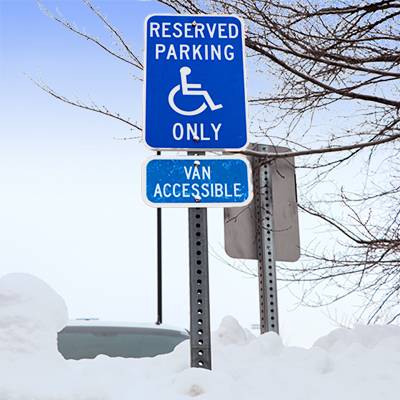A Rolling Perspective: It's The Most Hazardous Time Of The Year

"It’s the most hazardous time of the year!
There’ll be merchandise falling
and ’lectric carts stalling
and no room to steer…
It’s the most hazardous time of the year!"
My new lyrics to “It’s the Most Wonderful Time of the Year” may cause a chuckle, but if you need a wheelchair or electric cart to shop, it’s no laughing matter. From getting to the store to getting out of it, assistive device users face more obstacles than ever.
People like me, who can't afford gifts or decorations, still need to buy food and toiletries. Online grocery shopping is not available everywhere. Besides, it costs more than in-store, and there’s a delivery charge. Online outlets may not accept SNAP benefits either. (Please see the consumer tips at the bottom of this column to find money-saving hints for low-income, Medicaid and SNAP users.)
It’s not just about convenience. For me, grocery shopping is therapeutic, getting me out of the house and talking with people. When it comes to the holidays, though, this pleasant task becomes a source of panic attacks and sometimes even physical injury.
The other day I nearly brought down an entire end-cap when my back wheel caught the display’s corner. Worse, this particular one had gallons of antifreeze on the top shelf. The turning angle was tight, but I thought I could do it. Instead, I dragged one side of the end-cap three inches from its moorings, screeching all the way, before I realized what had happened. Shaken, I backed up and detached before all that merchandise landed on me or someone else.
I’ve identified three main hazards and ways that you can address them so the mobility-impaired loved ones in your life might enjoy safer shopping.
Parking
The holidays mean even more drivers park their cars or trucks smack in front of store access points. I should say “idle” in front, which is even worse. Not only are wheelchair users prevented from entering the store, but we’re forced to breathe in your vehicle’s exhaust fumes while we seek a safe way to get around you.
What can you do?
This should be a no-brainer, but sadly is not. Park courteously. Don’t ever block a store’s entrance. If you’re speedy enough to “dash in for just one thing,” then you’re agile enough to park elsewhere so those with impaired mobility will struggle less. If you think you get cold or wet on the way in, imagine what it’s like for those of us who move at a snail’s pace. And don’t idle your car. It’s not only against the law; it’s unkind.
Snow and Debris Removal
This affects everyone, of course, but wheelchair users most of all.
What can you do?
Well, if you’re in the snow removal business, know that disabled parking spots are not dumping places. Also, strive to keep those snow mountains far away from exits or entrances. A lot of wheelchair users depend on public transport to get to grocery stores, so city street snow-clearers, please be mindful of crosswalks and bus stops. Ask yourself, could someone with a wheelchair or walker cross here, or wait safely for a bus? If not, put the snow somewhere else when possible.
And businesses, landlords, and homeowners: please clear a path wide enough for a wheelchair. If it’s wide enough, is it clear enough? The more trodden the snow, the more dangerous it becomes. I’ve often had to cancel journeys because someone didn’t shovel their walk, or didn’t do it well, and I could not get to the TRAX or bus stop.
Product Placement and In-Store Hazards
Customer, what can you do?
Here again, park courteously. Most shoppers are innately mindful of where their carts are parked, but the holiday chaos can blunt natural instincts.
Further, if items have fallen into the aisle, please put them back on the shelf. If you notice a hazard that could cause injury or block a wheelchair’s progress, notify a staff member.
Employees, what can you do?
First, staff member, remove the hazard if one is pointed out to you. It’s worth the time. “The life you save may be your own,” for one thing. For another, your grateful wheelchair/walker customers will notice and frequent your store more often.
If there is never room in the aisle for customers to get by when you’re stocking, bring it up at a staff meeting. An idea of mine that the Holladay Sprouts Market adopted was to drive up and down each aisle with an electric cart before the store opens. That way displays can be moved to prevent injury and, incidentally, allow cart users to buy more items. If we can’t get into that aisle, we can’t buy what’s there. An employee’s physical perspective changes when he/she drives that cart around the entire store. It results not only in new awareness and compassion, it stimulates ideas that, if implemented, can transform customers’ shopping experiences and even increase a company’s profits. Innovative accessibility ideas benefit everyone, not just wheelchair users.
Your mind, now that you’ve read this, has new awarenesses too. Different perspectives empower us and engender lasting change. By remembering to park courteously, clear conscientiously, and place things mindfully both inside and outside the store, you can make the holidays less hazardous and more happy for us all.
Consumer Tips
- Watch for free shipping from online retailers during the holidays. Some even offer it for items shipped within a few days, if you spend the qualifying amount. If you receive Medicaid or SNAP, you may also qualify for a discount on Amazon Prime. (Go to the main Amazon page >> try prime >> see more plans. Under the gold button that says “try prime” there are options that ask if you’re a student or if you have a valid EBT card. If you do, click that option. When I clicked through, the rate was $5.99 per month. I tried to click on this more than once, and it only appeared the first time, so if you want to do it, do it on the first try!
- It’s a great time to order medical supplies, as many Amazon merchants are offering free shipping on every item.
- Your internet service provider may offer a reduced-speed, internet-only service for a lower price. You will not see these offers in their brochures or online; you must call or go in person to get them. Be persistent!
Jennifer Holland taught herself to read and write at age four and has been doing both ever since. Minnesota-born and Wisconsin-bred, she nonetheless inherited the Irish perchant for travel. Despite the shoestring budget, she visited a dozen countries before her diff-ablement, and even lived in Ireland for nearly fifteen years. Her encounters with other cultures inform the quirky insights into human behavior that find their expression in her poetry, novels, and non-fiction works. When she's not reading or writing, she enjoys chair yoga, video chats with her children and gradchildren, and living happily with MS on a tiny fixed income.


